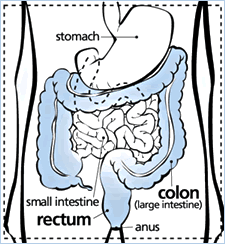The Basics

The colon and rectum are parts of the large intestine
What is Colorectal Cancer?
Cancer of the colon or rectum is called colorectal cancer. The colon and rectum are parts of the large intestine.
Colorectal cancer is the second leading cause of cancer death in the United States. At the beginning, colorectal cancer has no signs or symptoms. If undetected and untreated, colorectal cancer can spread to other parts of your body. Many cases can be prevented or cured if they are found early. That’s why it is important to get tested for colorectal cancer.
Colorectal Cancer Screening
Colorectal cancer screening tests can detect cancer early, when treatment can be very effective.
If your doctor finds growths inside your colon (poloyps) during testing, they can be removed before they become dangerous. If you find out you have cancer when you are tested, you can take steps to treat it right away.
My Risk
Most people who get colorectal cancer are over the age of 50. Other risk factors are:
- Growths (called polyps) inside the colon
- Family history of colorectal cancer
- Smoking
- Health conditions like Crohn’s disease
African Americans are more likely to die from colorectal cancer than any other group of Americans.
Take Action
If you are over 50, take action to prevent colorectal cancer. Learn how by clicking on the links below:
Get Tested for Colorectal Cancer
The best way to prevent colorectal cancer is to get tested early and often.
Get Active
Exercise may help reduce your risk of colorectal cancer.
Eat Healthy
A low-fat diet full of fruits and vegetables may help prevent colorectal cancer.
If you are Caring for Someone With Colorectal Cancer
Adopt Healthy Habits
Now you have another reason to stay healthy. Learn how to cook low-fat, low calorie meals. Take walks with your loved one. Pack healthy snacks before you leave the house.
Stay Positive
Set small goals and offer support.
Ask Questions and Take Notes When you are at the Doctor
This will help you remember important information.
Print out this list of questions to ask your doctor about colorectal cancer.
Take Care of Yourself
You might feel scared, angry, guilty, or sad. To help you deal with these feelings, learn as much as you can about your loved one’s disease. Share your feelings with your friends and family. Don’t be afraid to ask for help.